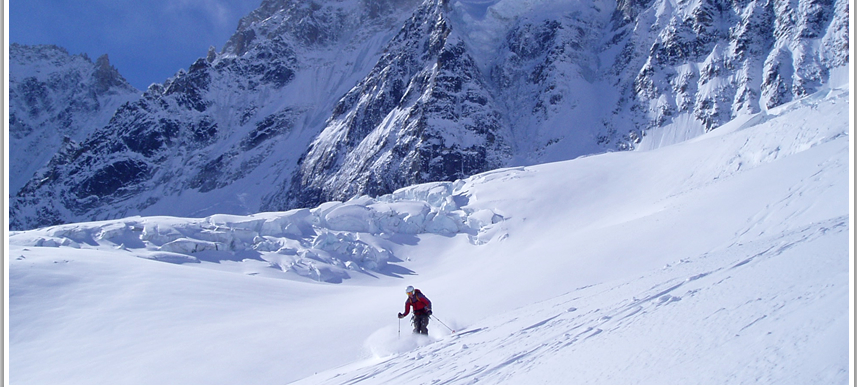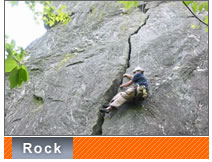Alpine Guides International
SPI Program
I instruct the American Mountain Guides Association's SPI course and assessment. I offer these programs close to home here in Vermont and New Hampshire.
The shoulder seasons of May and November are the best times to schedule this course. Courses will only book when there are 4 – 6 interested and qualified participants.
Please contact me to get more information. The following is as stated on the AMGA web site,
and can be found with lots more helpful information at , http://amga.com/programs/SPI.php
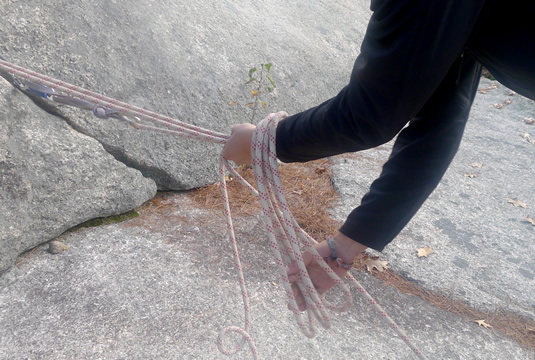
Equalizing multiple pinpoint anchors
American Mountain Guides Associations Single Pitch Instructor Course and Assessment
The AMGA Single Pitch Instructor Program is the only nationally and internationally recognized single pitch climbing instructor certification program. In 2009 the AMGA Single Pitch Instructor Program was recognized for meeting the "training standards" of the International Mountaineering and Climbing Federation (UIAA) and was granted the prestigious title of "Approved Association." No other organization in the United States offering training in single pitch terrain can make that claim. Also, the AMGA Single Pitch Instructor Program is recognized by many land managers, insurance companies, other associations and of course the general public. The AMGA Single Pitch Instructor Program has been created to fit in the AMGA Rock Discipline training program, taking off from the AMGA Climbing Wall Instructor Program and greatly improving the instructor's skill sets and integrating into the next level of training, the AMGA Rock Instructor Course. The SPI Program curriculum has been designed with this in mind and many of the SPI Program Providers work teaching higher level courses for the AMGA and serve on the AMGA's Technical Committee so they are actively involved in all levels of instructor and guide training in the AMGA.
The program is for current, active rock climbers that have a real desire to teach the rock climbing to novices in a single pitch setting. Candidates should be passionate rock climbers that have their own equipment, regularly climb and have been rock climbing outdoors for at least 12 months. Candidates could be current University Professors that teach climbing, Climbing Instructors, Scout Leaders, Summer Camp Professionals or climbers that wish to achieve additional training, experience and certification to gain employment as a Climbing Instructor in the Outdoor Industry. The SPI will be able to proficiently facilitate and instruct the sport of rock climbing in a single pitch setting.
For the purpose of the SPI Program a single pitch climb is one which:
Is climbed without intermediate belays and presents no difficulties on approach or retreat,
such as route finding, scrambling or navigating.
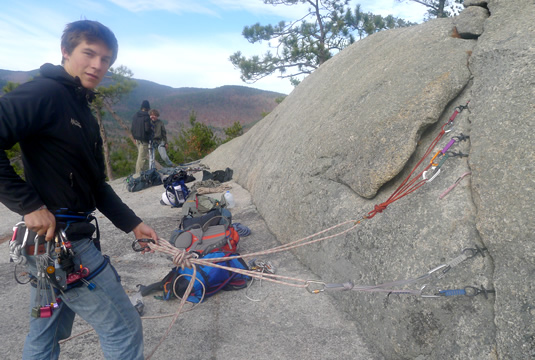
Equalizing with the Big Honking Knot, then Extending to edge
Course Length
The SPI Program is a three-day (27 hour) training course and separate two day (16 hour) assessment. Certification lasts for three years as long as the candidate keeps current AMGA Membership and First Aid Certification. After three years current SPI's can re-take the SPI Assessment to re-gain the SPI certification. Taking any higher level AMGA Course also re-certifies the SPI certification for another three years
SPI PROGRAM HOURS AND RATIOS
The SPI Course is:
A minimum of 27 hours, normally run as three consecutive nine hour days or day classes with evening sessions.
SPI Courses will not exceed a ratio of six students to one current SPI Program Provider.
The maximum number of students on any SPI Program will be twelve.
The SPI Assessment is:
A minimum of 16 hours.
The Assessment should be run over a two day period. Candidates that meet the Assessment
pre-requisites can take the Assessment directly following the Course if they desire although
this is not recommended.
SPI Assessment will not exceed a ratio of six students to one current SPI Program Provider.
The maximum number of students on any SPI Program will be twelve.
SPI COURSE OVERVIEW
The following three day outline is the standard progression for the SPI Course. Your course may have a different daily schedule and it is acceptable for Program Providers to do this as long as the entire curriculum is covered in your course. Program Providers may add to the curriculum on your course but must not omit pieces. SPI Program providers must make it clear when they are teaching outside the curriculum and should not evaluate beyond the curriculum. The course is normally run over three consecutive nine hour days but as long as all the curriculum is covered over 27 hours the course could be run over separate weekends or even as a semester class.
Day 1
Session 1: SPI and AMGA Program Overview
Session 2: Professionalism
Session 3: Equipment
Session 4: Knots and Hitches
Session 5: Belaying
Session 6: Protection and Anchoring
Session 7: Teaching
End of Day Debriefs
Day 2
Session 8: The Climbing Site
Session 9: Site Organization and Group Management
Session 10: Base Managed Sites
Session 11: Assistance Skills - Base Managed Sites
Session 12: Programming and Risk Management
End of Day Debriefs
Day 3
Session 13: Instructor Demo Lead Climb
Session 14: Top Managed Sites
Session 15: Lowering
Session 16: Assistance Skills - Top Managed Sites
Session 17: Rappelling
Session 18: Climbing Movement
Session 19: Review Sessions
Final Individual and Group Debriefs
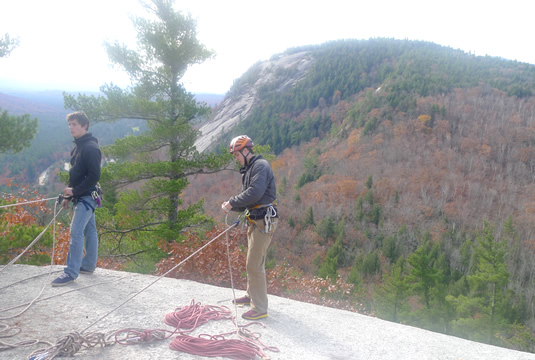
Self belaying using the "Instructor leg" to approach the edge
PRE-REQUISITES FOR SINGLE PITCH INSTRUCTOR COURSE
You meet the pre-requisites for the SPI course if you:
Have a genuine interest in rock climbing and instructing novices on single pitch crags.
Are at least 18 years old at the time of the course.
Have at least 12 months prior climbing experience.
Are an active climber with traditional lead climbing experience (leader placing pro).
Have trad lead climbed a minimum of 15 graded rock climbing routes (any grade).
Are capable of comfortably climbing 5.8 while on a top rope.
The above pre-requisites are absolute minimums and most candidates have way in excess of the above.
Without having at least this amount experience you are unlikely to play a constructive part on the
course or be able to make best use of the training. If you are unsure of your skill levels we
suggest hiring an AMGA/IFMGA certified guide to evaluate and enhance your skills and experience prior to SPI Program enrollment.
SPI ASSESSMENT OVERVIEW
The SPI Assessment is two days in length (minimum of 16 hours assessment time) and will take place at a
single pitch climbing area where there are a selection traditional lead routes in the 5.6
range and top roping routes in the 5.8 range. The assessment will examine all aspects of
institutional single pitch climbing that the Single Pitch Instructor may encounter. Day one
will look at climbing movement and all aspects of technical systems from anchoring to assistance
skills and general climbing competence. On day two the examiner may arrange for volunteer novice
clients (non-paying) for the candidates to instruct in a group setting. This is not required but
is a great benefit to the assessment process as the examiner can see candidates interact with real
novice climbers and the examinees do not have to 'pretend' to teach novice climbers who are actually
other examines on the assessment.
The examiners job is to bring out the best in the candidate, and give the candidate a comfortable and stress-free assessment. The candidate must show the examiner they have the technical and instructional skills to pass the AMGA Single Pitch Instructor Assessment. The SPI Assessment is broken down into four distinct evaluation sessions; climbing movement, technical skills, teaching ability and group management skills and candidate are evaluated by the AMGA marking system categories as explained below.
Assessment Categories
Risk Management
Client Care
Technical Systems
Application
Terrain Assessment
Movement Skills
Mountain Sense
Professionalism
Instructional Technique
In the AMGA SPI Program the same nine categories are used as for the rest of the
AMGA assessments in the guide programs. This is for uniformity throughout the AMGA
programs as they are all applicable to single pitch instruction and will help the candidate as they move onto higher level assessments.
PRE-REQUISITES FOR SPI ASSESSMENT
The SPI Assessment can be taken directly following the SPI Course if the candidate successfully completed the course and meets the Assessment pre-requisites.
However, it is highly recommended that the SPI Course candidate takes time practicing and consolidating the skills learned on the course before assessment (6-12 months).
You meet the SPI Assessment Pre-requisites if:
You have successfully completed an AMGA Single Pitch Instructor Course or AMGA Top Rope Site Manager Course.
You have trad lead climbed a minimum of 40 rock climbing routes. A large number of these should be at 5.6
grade and hopefully on a variety of rock types.
You are capable of comfortably lead climbing 5.6 traditional routes (leader placing protection).
You will demonstrate your leading ability on a variety of routes on the assessment.
You are capable of comfortably climbing 5.8 while on a top rope.
GAINING SPI CERTIFICATION
To gain SPI Certification candidates must:
Successfully pass the SPI Assessment
Hold current AMGA Membership at Associate level or higher
Hold current First Aid Certification (see SPI Certification First Aid Requirements)
SPI CERTIFICATION UPKEEP AND RECERTIFICATION
SPI Certification is only valid with current AMGA Membership and current, appropriate emergency medical certification
of the location that your are working in. If you let your either of these lapse your SPI Certification is
invalid until you rectify this by updating your AMGA Membership or emergency medical certification.
It is your professional responsibility to ensure you have current AMGA Membership and emergency medical certification.
SPI Certification lasts for three years from the date of assessment. There are three options for renewal:
Certified Single Pitch Instructors can take the two day SPI Assessment to renew their certification.
Certified Single Pitch Instructors who successfully complete any higher level AMGA course are granted SPI
certification for three years from the course end date. After completing a course please contact the AMGA so they can update your records.
Certified Single Pitch Instructors who attain AMGA Certification in any of the AMGA Mountain Guide Programs gain permanent SPI certification.
The SPI Certification must be current at the time the higher level certification is attained in order for the SPI Certification to become permanent.
After attaining a Mountain Guide Program certification, please contact the AMGA so they can update your records.
To keep SPI Certification current SPI's should seek out recertification before the expiration date of their certification.
Candidates that let their certification lapse can take part in the SPI Assessment
but they will not hold any certification between their SPI expiration date and successfully passing an SPI Assessment.
From a professional standpoint this is not advisable.
SPI CERTIFICATION FIRST AID REQUIREMENTS
First aid training is not required to take the course or assessment. For the Single
Pitch Instructor certification to be valid the AMGA requires you hold appropriate medical
certification for the location that you are working in. If you let your medical certification
lapse, your AMGA SPI Certification is invalid. It is the responsibility of the individual
to maintain appropriate medical certification.
Please email Ed Crothers, AMGA Climbing Instructor Program Director with any questions about the SPI Program: [email protected]
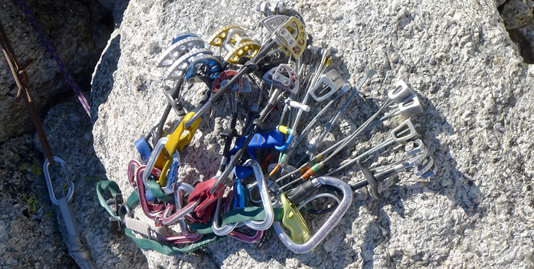
Tools of the Trade!
| 
